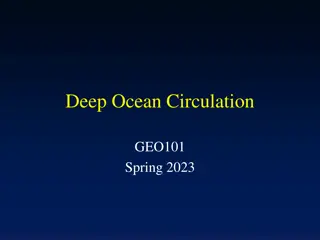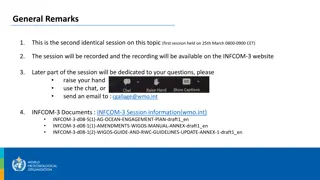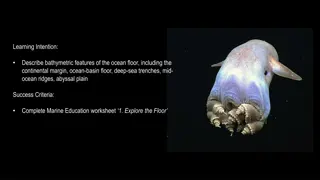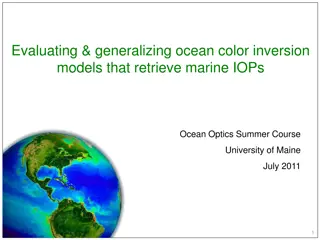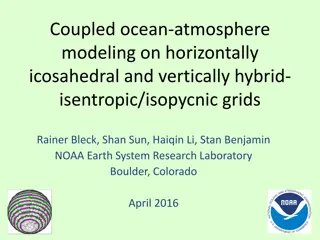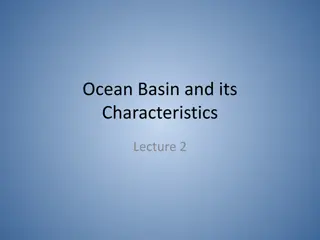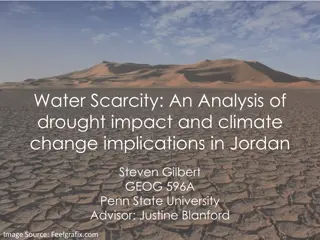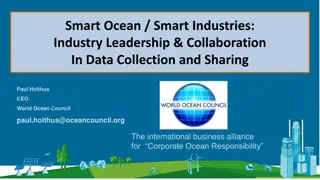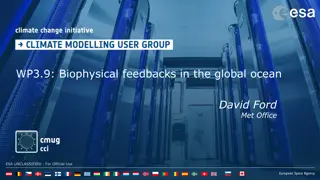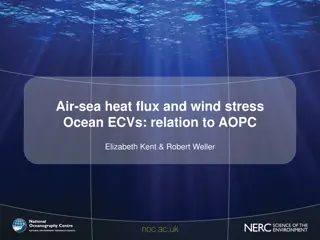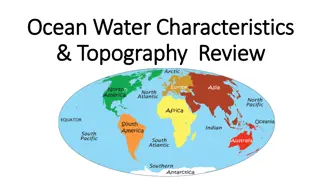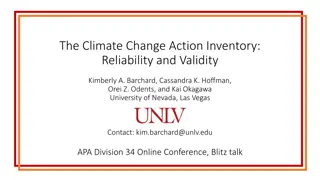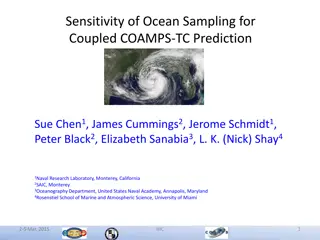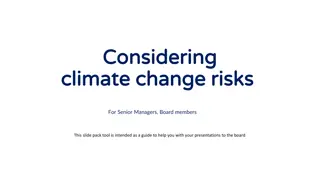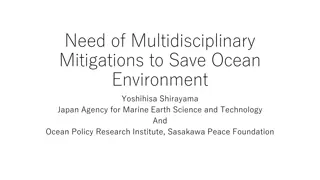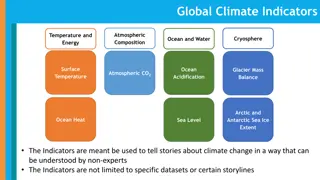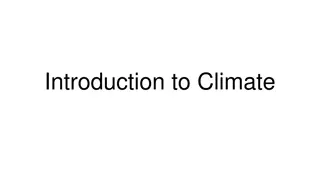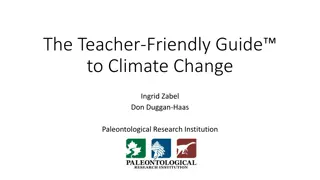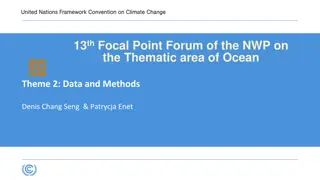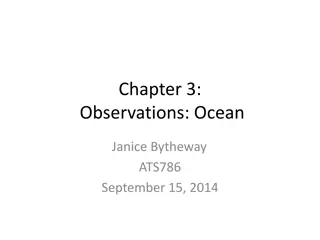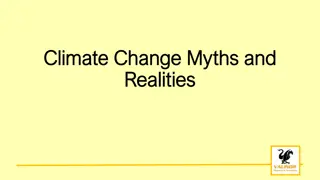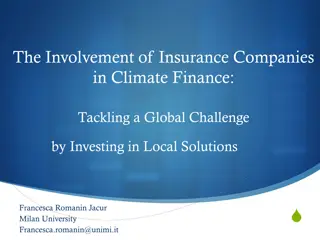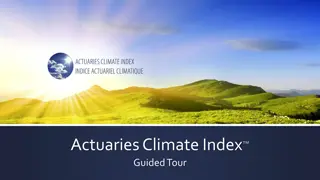Improving Health Amid Climate Change Challenges
Climate change has significant impact on health, requiring global sectors to act. Explore initiatives of the Ministry of Health in addressing climate-related health threats. Understand the interplay between climate change and health systems for a sustainable future. Learn the adverse effects of clim
4 views • 10 slides
Understanding Climate Change: Weather vs. Climate, Kppen-Geiger Classification, and Major Climate Zones
Explore the distinctions between weather and climate, delve into the Kppen-Geiger Climate Classification System, and discover major climate categories such as tropical climates. Gain insights into climate change and its impact on our environment.
8 views • 11 slides
National Climate Change Bill Overview
The National Climate Change Bill aims to establish an effective response to climate change in South Africa, promoting a transition to a low-carbon, climate-resilient economy. It focuses on coordinated actions, adaptive capacity enhancement, greenhouse gas management, and a fair global contribution.
8 views • 21 slides
Discovering Ocean's Challenges: Virtual Meetings with Researchers
Dive into the world of ocean exploration with your students through a series of virtual conferences with researchers and specialists, organized by the Tara Ocean Foundation. Explore topics such as ocean and climate, plastic pollution, plankton, and Arctic ice melting. Engage in presentations, Q&A se
0 views • 6 slides
Understanding Deep Ocean Circulation and Salinity Patterns
Explore the intricate relationship between ocean salinity, vertical structure, and deep-water currents in this informative collection of images and explanations. Discover how salt inputs and outputs influence ocean salinity levels, and learn about the factors that contribute to the vertical variatio
12 views • 21 slides
Examining the Global Centre for Climate Change and Atrocity Prevention
The document presents a case for establishing a pilot scheme for the Global Centre for Climate Change and Atrocity Prevention by Dr. Ben L. Parr. It includes an introduction outlining the need for such an initiative, an examination of the Climate Change and Atrocity Prevention NGO universe, and disc
9 views • 12 slides
AG-Ocean Engagement Plan: Enhancing Collaboration for Ocean Infrastructure Development
The AG-Ocean Engagement Plan aims to establish long-term working arrangements between WMO and the ocean infrastructure community to advance Earth System Approaches. AG-Ocean focuses on advisory roles, prioritizing key areas for impact. The plan identifies observations, data, and prediction as essent
1 views • 21 slides
Gender-based Climate Change Litigation: A Key Solution?
Gender-based climate change litigation is emerging as a potential solution to address the disproportionate impact of climate change on different genders. Various international bodies have recognized the importance of integrating a gender-responsive approach in climate action to uphold human rights,
4 views • 12 slides
Gender and Climate Change in Agriculture: Impacts and Adaptation Strategies
This workshop explores the intersection of gender and climate change in agriculture, emphasizing the importance of considering gender dynamics in adaptation planning. It covers the effects of climate change on men and women in agriculture, reasons for gender-sensitive adaptation planning, global and
0 views • 10 slides
Exploring Bathymetric Features of the Ocean Floor
Explore the fascinating bathymetric features of the ocean floor, including the continental margin, ocean basin floor, deep-sea trenches, mid-ocean ridges, and abyssal plain. Learn about submarine canyons like the Cape Range Canyon near Ningaloo Reef in Western Australia, and discover rare marine lif
0 views • 37 slides
Evaluation of Ocean Color Inversion Models for Retrieving Marine IOPs
Evaluating and generalizing ocean color inversion models to retrieve marine inherent optical properties (IOPs) is essential for understanding ocean dynamics. This involves choosing the right algorithm and validating its effectiveness, as discussed in the Ocean Optics Summer Course at the University
0 views • 23 slides
Coupled Ocean-Atmosphere Modeling on Icosahedral Grids
Coupled ocean-atmosphere modeling on horizontally icosahedral and vertically hybrid-isentropic/isopycnic grids is a cutting-edge approach to modeling climate variability. The design goals aim to achieve a global domain with no grid mismatch at the ocean-atmosphere interface, with key indicators such
1 views • 21 slides
Exploring the GEOTRACES Arctic Program and Its Scientific Objectives
The GEOTRACES Arctic Program aims to study marine biogeochemical cycles in the Arctic region, focusing on trace elements and isotopes. Through international collaboration, the program identifies processes affecting the distribution of key elements in the ocean. The unique Arctic environment, vulnera
0 views • 23 slides
Understanding Ocean Basins and Their Characteristics
Ocean basins are vast submarine regions that cover a significant portion of the Earth's surface, hosting the majority of the planet's water. These basins exhibit various features such as ocean ridges, deep-sea trenches, and seismic ridges. The ocean floor is constantly evolving due to plate tectonic
0 views • 18 slides
Climate Change and Development in Africa: A Journey from Kyoto to Paris
The journey of climate change negotiations in Africa, from key milestones in the climate change regime to the role of African institutions and bodies, such as the African Union and African Ministerial Conference on the Environment. Highlights include the entry into force of the UNFCCC, the adoption
1 views • 15 slides
Understanding Drought Impact and Climate Change in Jordan
Analysis of the impact of water scarcity and drought in Jordan, focusing on the most affected areas, implications of climate change, and the Middle East's vulnerability to water insecurity. The research explores the intersection of climate change, water resources, agriculture, and food security, hig
1 views • 24 slides
World Ocean Council: Industry Leadership and Collaboration for Sustainable Ocean Business
The World Ocean Council is an international alliance promoting leadership and collaboration among ocean industries for sustainable use and stewardship. By bringing together various sectors like shipping, oil/gas, fisheries, and tourism, the council aims to create a responsible ocean business communi
0 views • 22 slides
Analyzing Systemic Climate Risk in the Financial Sector
This study discusses systemic climate risk in the financial sector by examining the effects of climate risks on financial institutions. It aims to design a market-based framework to assess the vulnerability of financial institutions to climate risks and analyze potential contagion effects. The frame
0 views • 39 slides
Biophysical Feedbacks in the Global Ocean Research Overview
Biophysical feedbacks in the global ocean, including the impact of chlorophyll on solar radiation penetration, SST, and climate variability, are under-studied in climate models. This research assesses the effects of assimilating ocean color data and incorporating sea state in air-sea flux parameteri
0 views • 5 slides
An Ocean of Opportunity: Exploring Ocean Observing at Conference OceanObs 19
Discover the latest insights on air-sea heat flux, wind stress, and atmospheric ECVs at the OceanObs 19 conference in Hawaii. Engage with 1200 ocean observing scientists, program managers, and policy experts to chart the next decade of ocean observing and enhance international collaboration on ocean
1 views • 16 slides
Exploring Ocean Water Characteristics and Topography
In 1992, a crate of rubber duck toys fell into the Pacific Ocean, leading to unexpected discoveries about ocean currents and pollution. The North Pacific Gyre, home to the Great Pacific Garbage Patch, plays a crucial role in understanding ocean dynamics. Learn about ocean water properties, distribut
0 views • 10 slides
True or False Review - Ocean Currents and Climate Dynamics Quiz
Test your knowledge on ocean currents, climate dynamics, and related phenomena with this engaging true or false review game. Explore concepts such as the influence of global winds on surface currents, the Coriolis effect, the Gulf Stream, deep ocean currents, El Nino events, and more. Challenge your
0 views • 43 slides
Understanding Climate Change Action: Inventory, Reliability, and Factors
The Climate Change Action Inventory comprises 77 items measuring various actions to combat climate change across eight domains. The method involved 500 MTurk workers, with reliability analyses showing strong internal consistency. Findings indicate a positive correlation between climate change anxiet
1 views • 20 slides
Sensitivity of Ocean Sampling for Coupled COAMPS-TC Prediction Study
This study explores the optimal ocean sampling strategy for Hurricane Isaac (2012) using high-resolution in-situ observations. It investigates the sensitivity of tropical cyclone intensity change through assimilation of AXBT, AXCTD, and AXCP observations. Results show significant impact areas along
0 views • 12 slides
Addressing Climate Change Risks: Guidance for Senior Managers and Board Members
This slide pack tool provides guidance on addressing climate change risks for senior managers and board members. It covers key messages such as understanding obligations and gaps, identifying climate change risks, exploring responsibilities, and implementing actions to address these risks effectivel
0 views • 11 slides
Multidisciplinary Mitigations for Ocean Environment Conservation
Global ocean climate change poses significant threats to marine ecosystems, requiring multidisciplinary approaches for mitigation. Japanese research highlights expanding distributions of reef-building corals, deep-sea water temperature rise, ocean acidification impact on marine plankton, and thinnin
0 views • 4 slides
National Priorities for Climate Change Science and Knowledge in Canada
Canadians are experiencing firsthand the impacts of climate change, including wildfires, heatwaves, floods, hurricanes, and droughts. To address these challenges, foundational climate change science and knowledge are essential for understanding our changing environment, identifying impacts, making i
0 views • 9 slides
Understanding Global Climate Change Indicators
Explore various indicators related to global climate change, including atmospheric composition, temperature, cryosphere, ocean conditions, and extreme weather events. The indicators cover a wide range of topics such as glacier mass balance, ocean acidification, heavy precipitation, droughts, and hea
0 views • 8 slides
Understanding Climate and Its Impact on Earth
Exploring the fundamentals of climate, this comprehensive guide covers topics such as climate zones, climate formation, atmospheric composition, the role of CO2, ocean heat absorption, and circulation patterns. From the basics of weather and seasons to the significant impact of climate change, learn
0 views • 12 slides
The Teacher-Friendly Guide to Climate Change
The Teacher-Friendly Guide to Climate Change authored by Ingrid Zabel, Don Duggan-Haas, Robert Ross, and others explores topics such as climate measurement, natural causes of climate change, historical climate perspectives, and more. It delves into the significance of understanding past climates to
1 views • 12 slides
Addressing Knowledge Gaps and Needs in Ocean Data and Methods for Climate Change Adaptation
The 13th Focal Point Forum of the NWP focuses on the thematic area of Ocean Theme 2: Data and Methods, highlighting challenges in accessing reliable data for forecasting marine-climate extremes and assessing adaptive capacity. Knowledge gaps exist in essential ocean variables, hindering evidence-bas
0 views • 5 slides
Understanding NEMO: European Ocean Modeling Software
NEMO (Nucleus for European Modeling of the Ocean) is a comprehensive software used for numerical simulation of the ocean. Its components include the blue ocean (NEMO-OPA) for dynamics, white ocean (NEMO-LIM) for sea-ice simulation, and green ocean (NEMO-TOP) for biogeochemistry. NEMO produces model
0 views • 10 slides
Insights on Ocean Climate Change: Observations and Implications
Observations in this chapter highlight significant changes in ocean properties related to climate over the past 40 years. These changes include shifts in temperature, salinity, sea level, carbon levels, pH, and oxygen content. The patterns of change observed suggest a link between surface and subsur
0 views • 35 slides
Climate Change Myths and Realities: Debunking Common Misconceptions
This content discusses common myths surrounding climate change and provides evidence-backed realities to debunk them. Topics include the pause in warming, natural climate variability, misconceptions about climate models, the impact of CO2 on plant life, and the consensus among climate scientists. Th
0 views • 6 slides
Climate Change Litigation in Aotearoa/New Zealand: LCANZI Action and Judicial Review
The Lawyers for Climate Action NZ Incorporated (LCANZI) are actively involved in climate change litigation in Aotearoa/New Zealand, including challenging government decisions related to climate responses. A notable case involved a judicial review against Auckland Transport, where the High Court refu
0 views • 6 slides
The Role of Insurance Companies in Climate Finance: Addressing Global Challenges through Local Investments
Exploring the engagement of insurance companies in climate finance, this presentation highlights the significance of private sector involvement in tackling climate change at a local level. It delves into key concepts such as mitigation, adaptation, and the global scientific targets for combating cli
0 views • 11 slides
Understanding Marine Physics and Ocean Floor Features
Marine Physics is a sub-domain of oceanography focusing on physical conditions and processes in the ocean, including ocean waters' motions and properties. The ocean floor features various elements like the continental shelf, slope, rise, and abyssal plain. Sea mounts, guyots, abyssal hills, and mid-
0 views • 15 slides
Understanding the Actuaries Climate Index: A Comprehensive Guide
The Actuaries Climate Index (ACI) is an essential tool that measures climate risks using historical data collected since 1961. It focuses on extreme climate events and sea level changes, providing valuable insights into the impacts of climate change. By analyzing the ACI and its components, users ca
0 views • 18 slides
Deciphering Climate Variability Through Ocean Buoys Data Collection
Ocean buoys like TAO/TRITON provide valuable data on climate variability by measuring various parameters like sea-surface temperature, wind speed, humidity, and subsurface temperatures. Anomalies from normal conditions help identify patterns over time, aiding in understanding climate changes. Mainta
0 views • 5 slides
Canadian Climate Change Policy from a Climate Ethics Perspective
Explore the ethical implications of Canadian climate change policy, delving into the necessity of meeting targets established in the Paris Agreement, the need for rapid decarbonization, and the availability of climate-safe energy alternatives. The presentation emphasizes the urgency of action to mit
0 views • 16 slides




